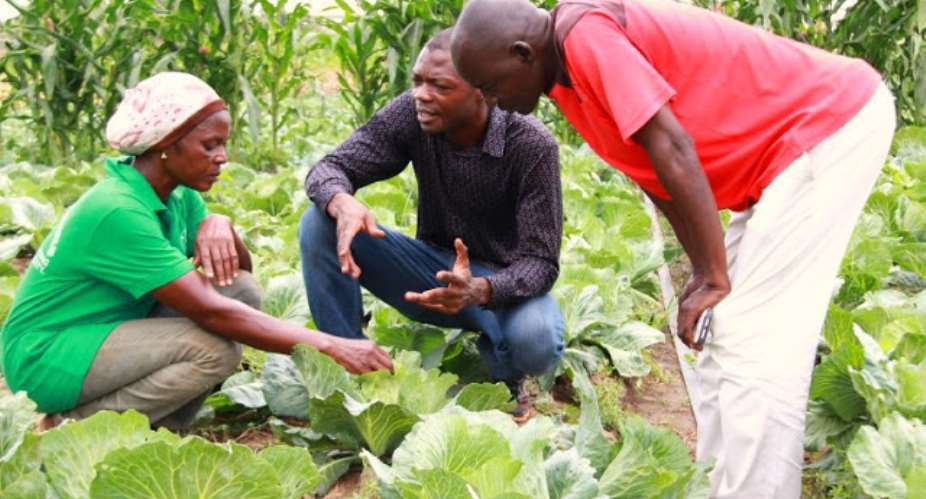All over the world, especially in developed countries, farmers and consumers are forming communities that revolve around food grown locally, yet in Africa, traditional or local agriculture is not given the full recognition it deserves, to promote the survival of the local farmer and also to sustain the economy.
Food has always played a fundamental role in human life; therefore, it doesn’t make sense at all for a country like Ghana, that agriculture plays an important role in its economic development, to import rice, while there are experienced farmers able to produce rice to meet the demand for local consumption.
Worldwide, food is no longer seen as a source of sustenance but as an integral part of a complex system in which nature and economy coexist. Thus; investment in agriculture is widely recognized as crucial for economic growth, poverty reduction, and improved food and nutrition security.
There are many important reasons Ghanaians must support the government to promote local consumption foods in the country. The less food has to travel to reach the store and our tables, the better it is for the environment.
Let's think about the quantity of polluting emissions released by the transport of food products on planes, trucks, and ships. We can, therefore, contribute to the reduction of pollution by choosing more often the local and organic food grown by our trusted farmers.
There is nothing more healthy than eating locally produced fresh foods. Ghana can produce quality banana or plantain, which one is healthy to eat, the fresh locally produced one or the imported ones which are often treated with ethylene gas to accelerate its ripening?
Choosing local food, on the other hand, can mature naturally on plants and be harvested at the right point. It also means preferring seasonal products and being sure that they are grown right next to us.
Local consumption food also gives the assurance of the safety of what we are eating. In the book ‘Aids, Origin, Spread, And Healing,’ by the German medical doctor, Wolff Geisler, Africans were deliberately inflicted with many diseases through food, water and medication from the United States of America. The same was done to Haitian boat refugees in American refugee camps.
The fact that we have been brainwashed that nothing good comes from Africa has also affected our lifestyle and eating habits. Long before the vaccine for malaria was discovered, our ancestors live on healthy herbs and vegetables. Today, Ghanaians still enjoy eating the healthy ‘cocoyam,’ leaves known as ‘Kontomire.’
Many small local farms are engaged in the conservation of biodiversity and by purchasing from them we can help this very important commitment to continue. We choose, if we can, farms that do not exploit the mono-cultural model and that are attentive to the balance of the surrounding ecosystems.
The vitamins found in fruit and vegetables begin to deteriorate from the moment these products are harvested. What remains of their nutritional value after they have faced a long journey? This is one more reason we need to depend on locally produced foods in Ghana.
The purchasing power of Ghanaians will assist and enhance local farmers to have enough capital to invest in farming, which might lead to a bumper harvest. Especially in a period of the food crisis, Ghana may still have enough food.
Buying local food means giving a hand to those farmers who are not only concerned with cultivating the land but who also think of protecting the surrounding ecosystems and wild animals that live in the area. For example, they could oversee the ecological corridors that favor the movement and migration of wild animals.
If the Ghanaian government wants the people not to depend on foreign food, they should be the first to set a good example. I am, therefore, pleased that Nana Akufo Addo has taken the right direction.
I will always criticize you, Nana Akufo Addo, for your errors and praise you for your right steps toward the development and sustaining of Ghana’s economy. This is one of them.





 This IMANI job no dey pap; the people you are fighting for are always fighting y...
This IMANI job no dey pap; the people you are fighting for are always fighting y...
 Prof. Naana Opoku-Agyemang has changed; you can see a certain sense of urgency –...
Prof. Naana Opoku-Agyemang has changed; you can see a certain sense of urgency –...
 MFWA Executive Director slams Akoma FM for engaging in ‘irresponsible’ media pra...
MFWA Executive Director slams Akoma FM for engaging in ‘irresponsible’ media pra...
 ‘Women must become millionaires too’ — Prof Jane Naana on establishment of Women...
‘Women must become millionaires too’ — Prof Jane Naana on establishment of Women...
 Some believe only in Ghanaian votes, not Ghana — Kofi Asare jabs politicians
Some believe only in Ghanaian votes, not Ghana — Kofi Asare jabs politicians
 Plan to make BEST sole aggregator of Sentuo Oil Refinery will create market chal...
Plan to make BEST sole aggregator of Sentuo Oil Refinery will create market chal...
 2024 elections: I can't have the man I removed from office as my successor — Aku...
2024 elections: I can't have the man I removed from office as my successor — Aku...
 2024 Elections: Immediate-past NPP Germany Branch Chairman garners massive votes...
2024 Elections: Immediate-past NPP Germany Branch Chairman garners massive votes...
 Gov’t focused on making Ghana energy self-sufficient, eco-friendly – Akufo-Addo
Gov’t focused on making Ghana energy self-sufficient, eco-friendly – Akufo-Addo
 April 25: Cedi sells at GHS13.74 to $1, GHS13.14 on BoG interbank
April 25: Cedi sells at GHS13.74 to $1, GHS13.14 on BoG interbank
